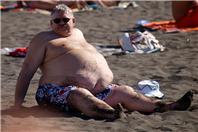When someone has a total thyroidectomy they are sent from having a wide range of thyroid levels – some would have been euthyroid, some hyperthyroid, some hypothyroid – to a state of having no source of thyroid hormone – within an hour or two.
This is obviously a very bad situation. Equally obviously, going through the usual dose titration from 25 or 50 mcg upwards over many weeks or months is not desirable. Why should they suffer an extended period of hypothyroidism? Replacement to somewhere near where they were before the operation should be achieved as quickly as possible.
One traditional way of estimating how much they might need was to apply a formula:
1.6 micrograms of levothyroxine per day for each kilogram the person weighs
(You would sometimes see doctors suggesting anything from 1.6 through to 2.3 mcg/kg.) So for someone of 60 kg that would work out at 96 mcg – and they would be given 100 mcg as the closest dose.
It was never a very well researched thing - more a rule of thumb. Many patients ended up needing more, but it did help to estimate a sensible starting dose which would be unlikely to overdose significantly.
More recently another formula was suggested that accounted for age and reduced the requirement as people aged. (I blogged at the time.)
Now, yet another formula! The people behind this new formula recognise that fat people need somewhat less than the old formula suggested; thin people need rather more. So they have factored in the BMI. And came up with this for the daily dose of levothyroxine:
For every kilogram the person weighs, they should be given this many micrograms of levothyroxine per day:
-0.018 × BMI + 2.13
(The old formula was often quoted using the person’s ”lean body mass” – but never gave any indication as to how you could handle any difference between that and their actual body mass.)
Please note: This is only intended to apply to people who have just had a total thyroidectomy. It is not appropriate to use it for other purposes. Mind, I have sometimes used the original formula as a “sanity check” on people’s doses of levothyroxine. If their dose is miles below or above what the formula suggests, maybe there is a problem to be looked at?
A summary of the paper appears here:
scienceindex.com/stories/27...
Abstract to the paper available here:
sciencedirect.com/science/a...
(Full paper requires payment.)
Out of interest, if you have had a total thyroidectomy, and are on a stable dose of levothyroxine only, would you be willing to post a) the dose you are actually on; b) how much the formula suggests you would need?
If you are not comfortable working it out, send me: your height, your weight and your current stable dose by private message. I will work them out and post the results.
FYI: BMI, body mass index is calculated as weight in kilograms divided by the square of height in meters.
Rod
Picture is a random overweight male
Added 18 January 2013 15:55
Excel Spreadsheet
I have created an Excel spreadsheet that is intended to show the results of all three known formulas. You are welcome to download it from here:
dropbox.com/s/779n1uycxtujx...
As it is brand new, and not sufficiently tested, please be careful in using it. And I certainly have not tried using it in other spreadsheet programs.
If you find anything wrong or a problem, please let me know asap by private message.
For now, please do not pass it on to others. I like to get more feedback before I would be comfortable with that.




 :
: